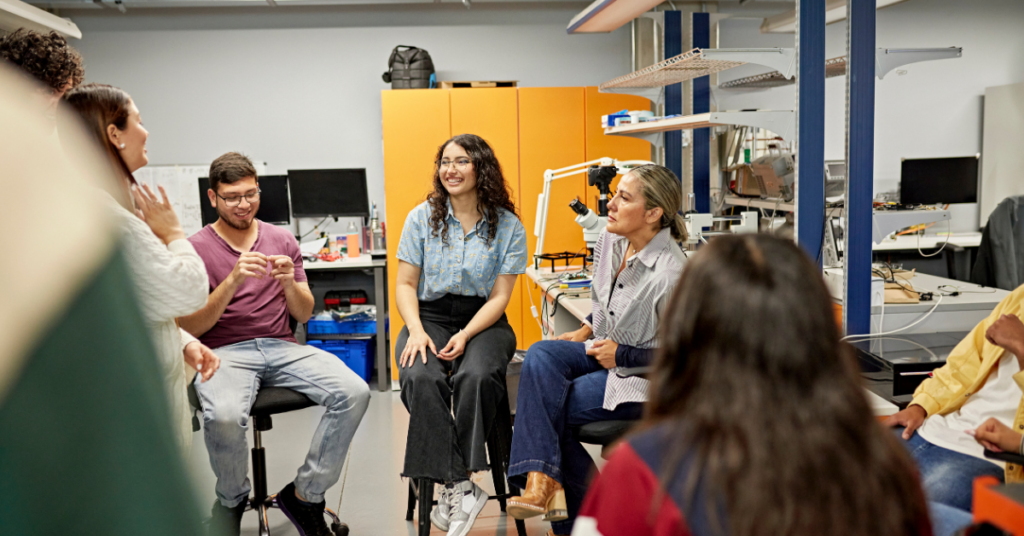
Recitation sessions are where the magic happens in college courses. They’re not your typical lectures; consider them a chill space to break down what you’ve learned and get into the details. In these smaller, more interactive settings, you get to clarify doubts, work on problems, and have discussions that make the course material click. What is recitation in college, you ask? Well, it’s your ticket to acing that class.
- What is Recitation in College and Why Recitation is Important
- Who Leads the Recitation?
- Typical Activities in Recitation
- How to Prepare for Recitation
- Attendance Policies
- Grading in Recitation
- Recitation vs. Lab
- Online Recitations
- Group Work in Recitation
- Maximizing the Benefits of Recitation
What is Recitation in College and Why Recitation is Important
What is recitation in college? Recitation sessions break down complex topics into smaller, more understandable pieces. They offer a different perspective on the material, making it easier to grasp.
The benefits of attending recitation go beyond just understanding the course material. The smaller class size means you can have your questions answered in real-time. It’s also a good opportunity to engage in meaningful discussions and meet potential study partners.
Professors include recitation in the syllabus for a reason. It’s an effective way to reinforce what you’ve learned in the main lectures. Sometimes, those lectures can be overwhelming, and recitation helps you process the information better.
A professor can change your grades from recitation. Many classes include quizzes or assignments during these sessions. Active participation can help you perform better on these assessments.
Who Leads the Recitation?
A teaching assistant, commonly known as a TA, usually leads recitation sessions. TAs are grad students or upper-level undergrads with a solid grasp of the course material. They’re there to help you understand the nitty-gritty and answer any questions.
Now, TAs aren’t professors, and that’s a good thing. They’re closer to your age, and they’ve recently been through the same struggles you’re facing in the course. This makes them more relatable and approachable.
You can expect your TA to be well-versed in the subject matter. They’ll lead discussions, review problems, and sometimes even grade your assignments or quizzes. They’re a resource you should take advantage of.
TAs also hold office hours outside of recitation. This is your chance to get one-on-one help with anything you find difficult to grasp. It’s a more relaxed setting where you can dive deeper into specific topics.
Typical Activities in Recitation
Recitation sessions are packed with activities that make the course material more digestible. You’ll often find yourself engaged in Q&A sessions where you can clear up any confusion about the lectures. It’s a safe space to ask those questions you might be too shy to ask in a big lecture hall.
Problem-solving is another big part of recitation. You’ll work through examples related to the course material. This hands-on approach helps solidify your understanding and gives you practical experience with the concepts.
Discussions are also common, and they’re more than just casual chats. You’ll delve into the course material, debate viewpoints, and maybe even challenge some of your own assumptions. It’s a great way to see the subject from multiple angles.
The interactive nature of recitation is what sets it apart. You’re not just passively absorbing information; you’re actively participating. This active involvement helps you retain the material better and makes the learning experience more dynamic.
Recitation in college is also a good time to get feedback. Whether it’s on an assignment, a concept, or your participation, knowing where you stand can help you improve.
How to Prepare for Recitation
Preparation is key for getting the most out of recitation. A quick review of your lecture notes before heading in can make a difference. It refreshes your memory and helps you identify what you’re still fuzzy on.
Having questions ready is a smart move. It gives you a roadmap for what you want from the session. Plus, it shows the TA that you’re engaged, which is always a good look.
Active participation is more than just showing up. It’s about being involved in discussions, asking questions, and even helping to answer others’ questions. The more you put into it, the more you get out of it.
Don’t underestimate the power of being prepared. It can turn a confusing lecture topic into something you’re comfortable with. It might even make you look forward to recitation.
Attendance Policies
Attendance in recitation is usually more relaxed than in big lectures, but don’t let that fool you. Some TAs take roll calls, while others might track attendance through in-class quizzes or assignments. Either way, your presence—or lack thereof—gets noticed.
Skipping recitation comes with consequences. You might miss crucial discussions, quizzes, or even some easy participation points. Over time, those missed opportunities can add up and affect your final grade.
Making recitation a priority is a no-brainer. It’s not just about avoiding penalties but maximizing your understanding of the course material. The more you attend, the better you’ll grasp the concepts, which can only help come exam time.
Grading in Recitation
Grading in recitation varies but usually includes participation, quizzes, and maybe even some small assignments. It’s not just about showing up; you’ve got to be engaged. Your TA will likely have a rubric or some guidelines so you know what to expect.
The weight of your recitation grade in the overall course grade can differ. Sometimes, it’s a small percentage, but it can be significant other times. Always check your syllabus to know where you stand.
To excel in recitation, participation is key. Don’t just be a wallflower; get involved in discussions and ask questions. The more active you are, the better your grade and the more you’ll get out of the class.
Also, don’t underestimate the power of preparation. Coming in with a good grasp of the lecture material can make you a star in recitation. You’ll be able to contribute more and get more out of the session.
Another tip is to build a rapport with your TA. Attend their office hours, ask for feedback, and show you’re committed. It can make a difference not just in your grade but in your overall learning experience.
Recitation vs. Lab
Recitation and lab sessions serve different purposes. Recitation is more about discussion and understanding the lecture material. Labs, on the other hand, are hands-on and focus on practical applications.
You might find yourself in a course with recitation and lab sessions. This usually happens in science or engineering courses where both theory and practice are essential. It’s like a double feature but for your brain.
Balancing the two can be a bit of a juggle. Recitation will require you to review lecture notes and come prepared to discuss. Labs will often require their own prep, like reading lab manuals or doing pre-lab assignments.
Time management is your friend here. Keep track of what’s due for both recitation and lab so you’re not caught off guard. A planner or a good calendar app can be a lifesaver.
Also, don’t hesitate to reach out for help if you’re struggling to keep up with both. Your TA and professor are there to help, and they can offer strategies for managing the workload.
Online Recitations
Virtual recitations have become more common, thanks to remote learning. They’re usually conducted via video conferencing apps like Zoom or Microsoft Teams.
The format is pretty similar to in-person recitations. You’ll discuss lecture material, solve problems, and have Q&A sessions. The main difference is you do it from the comfort of your own space.
Treat them like you would an in-person class to get the most out of online sessions. That means no multitasking. Close those extra tabs and focus on the recitation.
Wearing headphones can help you concentrate better. It minimizes distractions and makes it easier to hear the TA or professor.
Participation is key, even online. Use the chat function to ask questions or give answers. If you’re comfortable, turn on your camera; it can make the session more engaging for everyone.
Group Work in Recitation
Teamwork is a big part of recitation. You’ll often work in groups to solve problems or discuss topics. It’s a way to pool knowledge and tackle more complex issues.
Effective collaboration is crucial. Make sure everyone in the group has a voice. You can divide tasks based on each person’s strengths.
Communication apps like Slack or Discord can be helpful. They allow you to share files and discuss things outside of class time.
Group activities aren’t just busy work. They help you understand the material from different perspectives. You get to see how your classmates approach problems, which can offer you new insights.
Another perk is that group work can ease the pressure. If you’re stuck on a concept, chances are someone in your group can help you out. It’s a two-way street; you offer your expertise and gain from theirs.
Maximizing the Benefits of Recitation
Recitation sessions are more than just an extension of lectures. They’re interactive and designed to deepen your understanding. You get to apply what you’ve learned in a hands-on way.
- Preparation is key. Review your lecture notes and jot down any questions you have. This way, you’re not just a passive listener but an active participant.
- Don’t hesitate to speak up. If something’s unclear, chances are you’re not the only one confused. Your question could help clarify things for everyone.
- Take notes, but not just on what’s on the board. Jot down the discussion points, the questions raised, and the solutions offered. These can be invaluable study aids later on. So you may be interested in articles about how to take notes from a textbook and shorthand writing.
- Engage with your classmates. Recitation is a great time to learn from your peers, not just the TA. Different people understand and explain things differently, and you can benefit from that diversity. In addition, during recreation courses, you can make new friends in college.
- Recitation is also an excellent time to get to know your TA. They’re usually more accessible than the professor and can offer insights into what’s essential for exams or projects.
- Use the resources available to you. Many recitations offer supplementary materials like handouts or online modules. These can provide additional perspectives and practice problems.
- Don’t just attend; be present. Put your phone away and eliminate distractions. Stay focused, and you’ll get more.
After recitation in college, review what you’ve learned while it’s still fresh. This reinforces the material and helps identify any gaps in your understanding.
Conclusion
So what is recitation in college? Recitation sessions are a golden opportunity to deepen your understanding of course material, engage with peers, and get personalized help from TAs. The more you put into it—preparation, participation, or simply being present—the more you’ll get out. So make the most of these sessions; they’re a valuable tool in your academic toolkit.



